TechRadar Verdict
Audio enthusiasts will find a lot to love with the Samsung HW-MS750 Sound+ Soundbar. With cutting edge technology, like Ultra High Quality 32-bit upscaling and Distortion-Cancelling Bass, this soundbar has no problem putting out wall-shaking audio at an exceptional level of clarity.
Pros
- +
Substantial sound output
- +
Really talented music performer
- +
Tons of connectivity options
- +
Even better with the W700 subwoofer
Cons
- -
Some balancing issues
- -
No Dolby Atmos support
- -
Middle child in terms of value
Why you can trust TechRadar
With the arrival of the Samsung HW-MS750 Sound+ Soundbar, Samsung is confirming its place in the great pantheon of audio manufacturers: Klipsch, Audio-Technica, Polk, Bose, KEF, and Harman Kardon, say.
Samsung's meteoric rise to aural greatness actually started with the Samsung HW-K950 – a spectacular-sounding Dolby Atmos soundbar – back in 2016, then continued with the even-more-impressive (and more affordable) HW-MS650. Now it looks as though we've reached the zenith with the all-new Samsung HW-MS750 Sound+ Soundbar.
The HW-MS750 is a robust, powerful soundbar that any home cinema enthusiast will enjoy: it boasts 11 speakers in a 5.0 channel configuration, supports 4K passthrough via two HDMI ports, 32-bit UHQ audio upscaling and, should its 35 to 20,000Hz frequency range not be enough, it can connect to Samsung’s new W700 wireless subwoofer that goes as low as 27Hz.
In short, the HW-MS750 is almost perfect, just like its predecessors.
Samsung HW-MS750 Sound+ Soundbar: design
While we wouldn't call the Samsung HW-MS750 an exact clone of the MS650 in terms of design, their exteriors are … for a better word, identical. That is to say both the MS750 and MS650 models, are a combination of matte black plastic along the front and top grille, and stunning brushed aluminum on the sides, back and bottom.
The overall Samsung HW-MS750 Sound+ Soundbar package is solidly built, weighing in at a relatively substantial 13.89 lbs and decently wide at 45.28 x 3.15 x 5.13 inches (W x H x D).
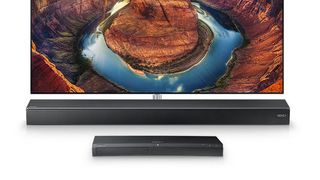
Before we move on, it's worth emphasizing that, like the HW-MS650, the MS750 stands at a lofty 3.15 inches high. What that means – in case you can’t picture it – is that the soundbar sits high enough to block some IR sensors on lower seated TVs and, in certain cases, to obscure the bottom part of the screen. So take heed of its height lest you buy it and find you can't turn on your TV anymore.
Samsung also includes VESA mounting points for attaching the MS750 soundbar to the wall, and a TV power loopthrough feature that means you can use just a single plug socket to power both the soundbar and your TV – a very nifty feature.
At this point, though, you might be wondering how exactly the MS750 is different than the MS650. The answer is that the MS750 is rocking 11 speakers inside the soundbar (versus the nine inside the MS650) and one additional HDMI passthrough on the underside. Those changes aren't revolutionary by any means, but they do make a subtle impact on the overall product.
Dimensions: 45.28 x 3.15 x 5.13 inches (W x H x D) | Speaker configuration: 5.0 | Claimed audio power: N/A | Connections: 2 x 4K/HDR HDMI loopthrough, 1 x optical audio input, 3.5mm audio port, 2-way Bluetooth, Wi-Fi
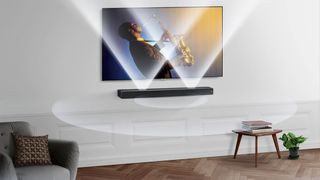
Samsung HW-MS750 Sound+ Soundbar: performance
The best single word to describe the HW-MS750's performance would be "versatile". We say that because there are a half-dozen ways to connect the soundbar to any of your devices – including Bluetooth, HDMI ARC, 3.5mm auxiliary or optical audio cable – and the performance manages to remain consistent regardless of which connection option you choose.
If you're looking to control your audio without a remote, there's also Samsung's multi-room audio app that mimics Sonos in its ability to control music playback over any number of Samsung devices – handy if you're considering building out an entire ecosystem of products from the Samsung HW-MS750 Sound+ Soundbar.
Samsung's soundbar supports most of the largest music streaming apps through the app, including Spotify, Deezer, Tidal, Amazon Music, TuneIn and Pandora. For a soundbar, it's pretty well stocked on connectivity options.
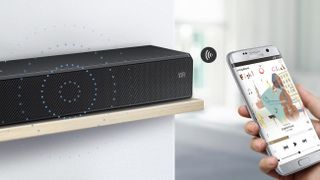
In terms of straight sound output, you'll find a lot to like here – especially if you take the time to delve into the settings and tweak the EQ. Fully calibrated, we found that the MS750 Sound+ had excellent, robust and easy-to-hear mid tones with warm, audible highs and decent bass response. Bass becomes admittedly better when you wirelessly connect it to the W700 subwoofer, but the soundbar outputs a respectable amount of bass on its own.
Like the MS650 before it, the soundstage and separation with the MS750 is downright exceptional. There's great separation between left and right channels, especially considering the unibody design, that helps to make certain songs sound even better and gives action sequences even more immersiveness.
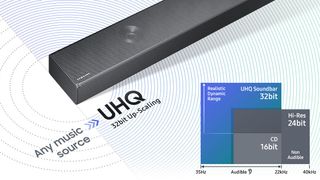
That's not even mentioning the 32-bit Ultra High Quality (UHQ) upsampling or Distortion-Cancelling Bass that's happening behind the scenes – probably two of the most important pillars of the soundbar's success.
Combined, they help add clarity and volume to the speaker, accentuating mids and highs and amplifying the low-end. They're two of the best features of the MS650, and we're happy to see them return in full form here.
That’s not to say the performance of the MS750 Sound+ soundbar is flawless, however.
While testing the Samsung MS750 there were the one or two times that the highs and lows overshadowed the mids – forcing us to do the old fashioned raising of the volume when someone was talking, then lowering it when the action resumed. It didn't happen often, but when it did it was a frustrating experience.
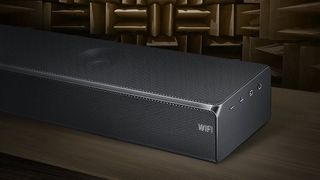
Samsung HW-MS750 Sound+ Soundbar: value
The Samsung HW-MS750 Sound+ sits directly in the middle of the company's soundbar offerings at launch and, unfortunately, that's a double-edged sword.
Coming in at $699 (£699 / AU$999), it's just on the edge of what we'd consider affordable. It's not exactly an impulse buy for the price, but considering that soundbars of this quality can trend upwards of $1,000/£1,000 it doesn't feel like Samsung totally whiffed on the MS750 price.
Where the soundbar faces competition, ironically, is within Samsung’s own catalog of soundbars. For a few hundred dollars/quid less, you can pick up the exceptional Samsung HW-MS650 Sound+ Soundbar, and for a few hundred more, you can upgrade to the far more immersive Samsung HW-K850 (which adds Dolby Atmos to the mix). Whether you move higher or lower in the range, there's arguably better value to be found.
We liked
In terms of power and performance from a 5.0 channel soundbar, it’s hard to do better than the Samsung HW-MS750 Sound+. Including cutting edge technology like Ultra High Quality 32-bit upscaling and Distortion-Cancelling Bass, the speaker has no problem outputting wall-shaking volume at an exceptional level of clarity.
We disliked
While the soundbar had a few minor hiccups here and there, the biggest problem we found with the HW-MS750 Sound+ is that it doesn’t provide the best value in Samsung's line-up. You could spend much less and walk away with the excellent Samsung HW-MS650, or plunk down a bit more to audition Dolby Atmos surround sound in your home. The middle-ground, despite its usual connotations, isn't necessarily the best spot to be in here.
Final verdict
Taken on its own merit, the Samsung HW-MS750 Sound+ Soundbar is a fantastically robust-sounding piece of equipment. It does wonders for hard-to-hear mids while simultaneously enhancing and invigorating the high and low-end of the audio spectrum.
While it's certainly worth auditioning for yourself, we feel it's also worth considering the MS750's siblings – the more affordable Samsung HW-MS650, and the Atmos-equipped Samsung HW-K850 soundbar – both of which are perhaps better value depending on your budget.
- Don't miss our round-up of the Best Soundbars of 2017
Nick Pino is Managing Editor, TV and AV for TechRadar's sister site, Tom's Guide. Previously, he was the Senior Editor of Home Entertainment at TechRadar, covering TVs, headphones, speakers, video games, VR and streaming devices. He's also written for GamesRadar+, Official Xbox Magazine, PC Gamer and other outlets over the last decade, and he has a degree in computer science he's not using if anyone wants it.

Until Dawn's movie adaptation won't follow the same story — here's why I think that's a good thing

I’ve found a new AI podcast creator, and it leaves Google’s NotebookLM in the dust

Severance season 2 review: Apple TV Plus' superb mystery thriller gets back to work with a bigger, bolder, and more brilliantly bizarre entry
